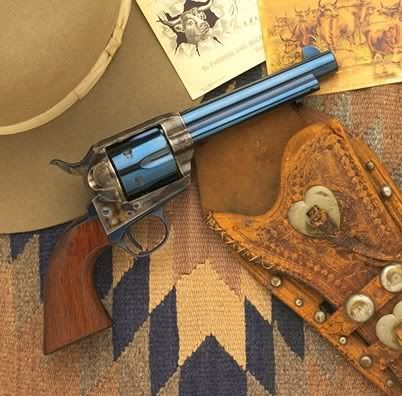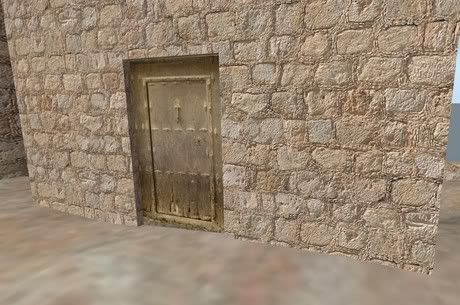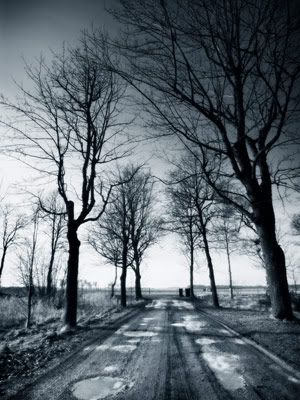
For the TerribleMinds flash fiction challenge, Must Love Guns.
His fingers, stained with soot and grease, ached to their bones. He removed the visor he’d worn during the process and reached for the nearby cloth. He couldn’t take his eyes from his work as he pulled the towel over one hand, then the other. By the light of the forge and candles, the effect was nearly hypnotic.
The pistol had started life as a standard Colt Peacemaker. A couple of dollars at a general store would have picked one up. But the order had been for something special. The case had been made for the weapon to become one of a kind. Bittersweetness slid through the smith’s synapses as his cleaned hands gently picked up the gun.
He’d laid gold filligree into the handle, like vines climbing up the ivory. Ivy leaves here and there caught the light, their leaves made from tiny shards of emerald. The result was a grip less likely to slip from a gunman’s fingers, singular in vision and still clear of purpose. The metal of the pistol’s body and barrel were engraved with scenes of nature, the heads of wolves, eagles and moutain loins appearing here and there. Lovely but dangerous, that had been the motif.
He checked the cylinder slowly, one click at a time. Boring the chambers out of a fresh block had been a painstaking task. He’d only been able to make room for five cartridges, but the stopping power of the .50 calibre shells used in the old Remingtons was still quite decent, and she’d be guranteed to make one hell of a racket. Satisfied that he’d cleared the block and barrel of all obstructions, he turned from the workbench to the counter and laid the weapon for the customer to see.
“Do you know why I stopped making guns?”
He paused, removing his spectacles and reaching for his pipe. His customer waited patiently while he lit up his cavendish and took a long pull.
“I’d heard of a shoot-out near Barstow. Outlaw ran afoul of a couple Marshalls. Crowd was followin’ the lawmen, as they do sometimes, and the outlaw just started shootin’. Marshalls took him down quick as you please, but before they could the bastard had shot a little boy.”
He turned the revolver on the counter so his audience could see his initials on the butt of the gun.
“Every gun I make has my stamp. So when they took the gun from the dead man they brought it to me, told me what’d happened. Turned out the outlaw’d been seventeen, and I’d sold this to his father a few years back. The boy stole it when he turned to robbin’, and now it’d put a bullet through a little boy’s spine.”
The customer said nothing. The gunsmith studied the other for a moment, puffing on his pipe.
“Been makin’ horseshoes an’ farm equipment ever since. Until you walked in.”
He laid his hand on the gun, feeling the engraving and fillagree under his fingertips.
“This is without a doubt the finest gun I’ve ever made. It’s beautiful, powerful an’ compact. The Devil himself is gonna come t’ fear it, provided you ain’t usin’ it for any purpose o’ his.”
“Let me tell you what I’m going to do with it.”
The gunsmith waited. He put the pipe back in his mouth.
“I’m going to pay you what I promised for this gun. And then I’m going to find the men who took my little girl. If they return her safe and sound there will be no cause for me to even fire this weapon.”
The customer reached out for the gun. The gloved hand took a hold of the ivory, gold and emeralds. The pistol spun on one finger for a moment. The other hand pressed the rod to eject the cylinder. Blue eyes looked through the bores, then the gun was shut again. The customer tipped her hat up to regard the gunsmith evenly.
“If they’ve harmed a hair on her golden head, I swear by God and His archangels I’ll put every single one of them in the ground with this gun.”
He studied her for a moment, this haunted and driven woman who’d come to him for a gun. She’d told him of the night her girl had been taken. Her eyes no longer had the redness of tears, and by all measure of such things she’d be beautiful, and when she first arrived in town she seemed no different than other pretty girls looking to make money on the frontier. But standing there, in a man’s riding clothes and holding the finest gun he’d ever made, the gunsmith considered for a moment that maybe she could swear by God and His archangels with such resolve because she knew them on a rather personal level.
He pulled a box of Remington .50s out and dropped it on the counter.
“You’re gonna need these, and I ain’t gonna charge you extra for ’em.”





